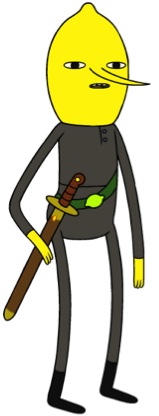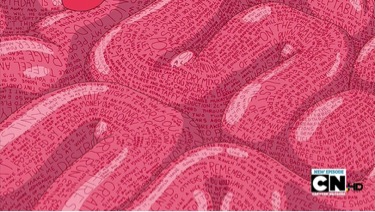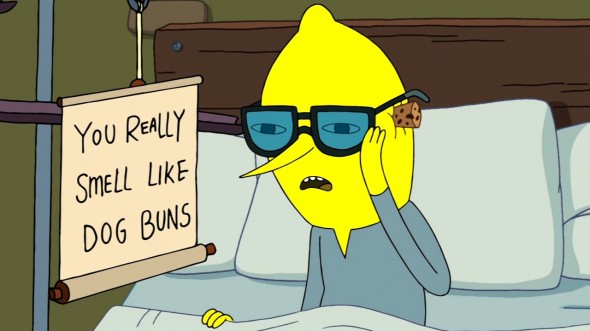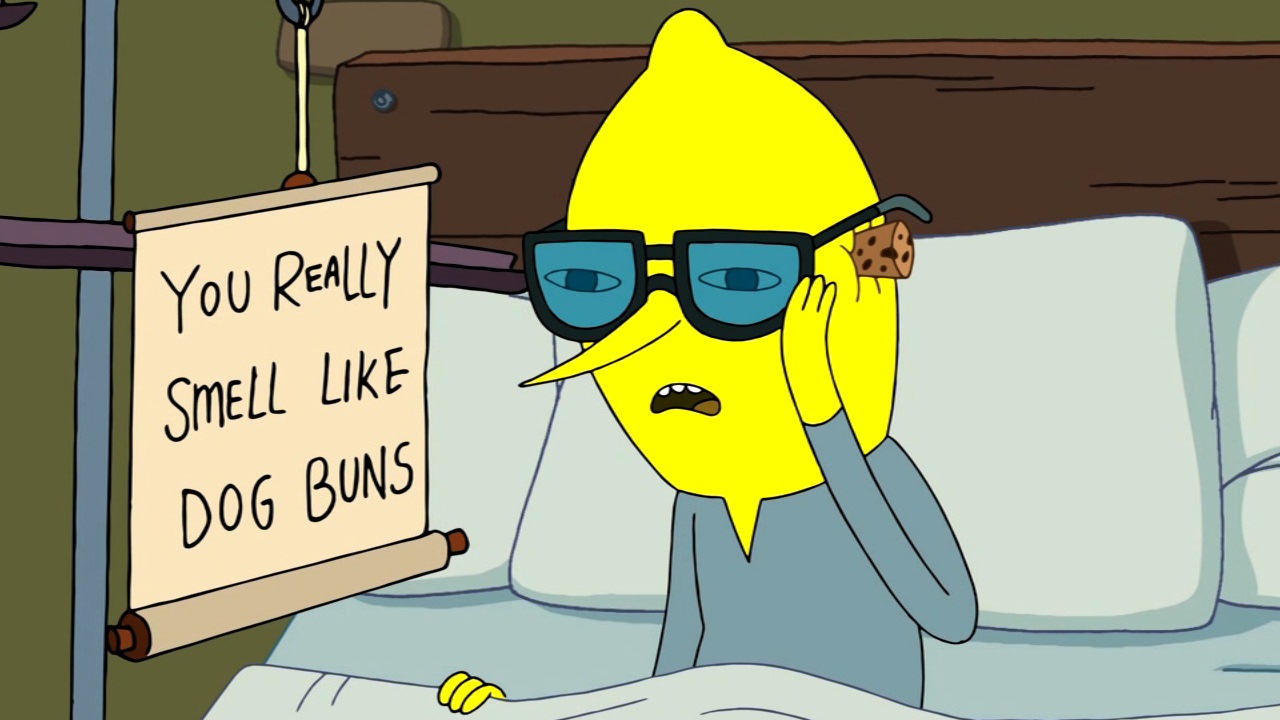[Enjoy this guest post by Daniel Elliot! – Ed]
I’ve been watching some Adventure Time, and it occurs to me what an interesting stance it seems to take on mental illness and cognitive disabilities.
I’m particularly interested in the characterization and portrayal of Lemongrab and his clone.

Behold: the test-subject that launched one thousand neurology papers. Or at least, that should.
A Short Description of the Earl of Lemongrab
It seems very clear that Lemongrab is meant to represent people on the Autism Spectrum. He is without empathy and seems to view other characters as faulty tools rather than fully realized people. He is extremely tense, obsessive and unable to function when people do not immediately comply with his orders. He distinctively speaks in a loud, piercing monotone which has no variability with the situation, and his language seems to be more of a running narration than an attempt to communicate with others. He is needlessly cruel to his subjects without any apparent understanding of their subjective experience.
In some episodes he is accompanied by a clone which Princess Bubblegum created to keep him company. There is no meaningful difference between the two Lemongrabs; for all intents and purposes they are the same character, and I will treat them as a single entity.
He is the Frankenstein-esque product of scientific error in Princess Bubblegum’s experimentation. Many of his stories are the story of Princess Bubblegum trying to cope with the challenges of having a cognitively impaired child whose inability to function normally constantly hurts himself and others, and the frustrations of this task.

Follow me as me dive deep into the twisted mind of a lemon. Enter the Heart of Citrus.
Lemongrab as an Antagonist
Lemongrab is obnoxious and frustrating to deal with, but this alone is insufficient to make him an antagonist except to the most ruthless of ableists. Let me give a representative example of a plot where he is pitted against our heroes, Finn and Jake:
In the episode “It’s all your fault”, the Lemongrabs learn the Princess’s secret of turning inanimate candy into living creatures, and immediately develop a compulsive need to animate any piece of candy material they can get their hands on. They quickly exhaust their entire food supply, leaving them with a castle full of nightmarish sentient monstrosities and no food. Obviously, these creatures are no sooner created than they are plunged into a Malthusian crisis and inevitably degenerate into cannibalism. When Finn and Jake arrive with an emergency supply of precious candy seeds to build an agricultural base to feed the starving masses, the staving Lemongrabs waste no time… in turning their last hope for survival into a living, vomiting wad.
Deciding that their actions are the Princess’s fault (for accidentally allowing them to learn how to animate candy) they command their giant Lemongrab-y monster to seize all the candy in the Candy Kingdom by force. The monster (which acts very Lemongrab-y) is stopped by a kind of blunt-force heart surgery which causes it to suddenly feel empathy and do what was necessary to end a candy-humanitarian (sucrositarian?) crisis by committing suicide and allowing its body to feed the starving masses.
What happens next is very curious indeed: When the suggestion is made to Princess Bubblegum in the next scene to fix the Lemongrabs the same way, she responds “their hearts are fine – they’re just like this.” Dismissing out of hand the possibility of “fixing” them, her solution is simply to keep them under closer supervision.
This pattern is repeated in many instances where the solution to problems caused by Lemongrab (and sometimes his clone) harming others is to accommodate them in a way where they can be happy. The key thing to note here is that they are always treated as beings with a right to exist and an effort is always made to make them happy.
The Ice-king

The world’s most adorable superpowered serial rapist
Compare this to how the Ice-king is treated when he causes trouble with his similarly obsessive behavior. He also behaves in extremely selfish and antisocial ways, and is also completely deluded about other people’s regard for him, acting shocked when people react negatively to his obviously destructive behavior. We even know that he was once a kind, friendly human named Simon who had a fiancé and saved Marceline as a child during the Mushroom War. He was slowly turned into the Ice King by the crown, and even begged all who would listen for mercy for what he might do under its influence.
He is treated as an object of derision and contempt by all (except Marceline… kinda) even after his tragic origin story is revealed to Finn and Jake. In their future encounters they show no pity for him, make no accommodations, and never attempt to make his lonely existence less bleak.
Why this discrepancy?
The UNACCEPTABLLLLE Answers (for people who like being wrong)
One possibility lies in the fact that only one of them has their creator still living. Both are the unwanted and embarrassing creations of smart and caring people, but the Ice King’s creator, Simon, was destroyed in the Ice King’s creation, leaving no one to care for him, curb his excesses, and advocate for his wellbeing.
If Princess Bubblegum wasn’t Finn and Jake’s friend, what are the odds that Finn and Jake would be so willing to accommodate Lemongrab, even after he creates monstrosities, imprisons innocent people for being minor inconveniences and even tries to brainwash 3 children through prolonged torture simply because he didn’t understand them and believed they should be his slaves?
https://www.youtube.com/watch?v=OdNVSNjjNbk
Or for that matter, attempting to eat other fully conscious beings alive in order to solve rather minor problems? (Which he has done on at least 3 occasions, by my count.)
Ice King may be a delusional stalker/kidnapper, but does anyone ever try to find him companions the way Finn, Jake and Princess Bubblegum try repeatedly with Lemongrab? Perhaps Simon would if he were still around.
Another possibility is in the fact that Simon chose to put on the crown and become what he became, while Lemongrab had no say in his own creation. Under this reading, the Ice King’s sadness is penance for the actions which made him what he is, while the problems caused by Lemongrab’s existence are borne as penance by Princess Bubblegum for her mistakes. Lemongrab has no responsibility for what he is, so punishing him would be a cruel injustice. This is lampshaded in the episode “All Your Fault” when the Lemongrabs blame others for giving them the opportunity to make the mistakes that they were inevitably going to make (turning their lifetime’s food supply into an army of starving candy monstrosities).
The Right Answer
There is a third possibility here, which is that this whole thing is a subtle commentary on the politics and public perceptions of cognitive impairment and mental illness. Lemongrab appears to have what we can easily recognize as a common, diagnosable and widely known cognitive impairment (Autism) which shifts the perception of responsibility for his actions. If there is a clinical name for why he does what he does, then these actions are not perceived as originating from him but from the impairment. He becomes dissociated into two entities, the person and the problem (much as Lemongrab becomes two separate people), and this distinction gives him an excuse, at the expense of robbing him of agency in the eyes of others.
Ice King, on the other hand, fits the profile of a person who we would describe in non-clinical terms: weird, creepy, delusional, a loser. Note that these are not descriptors of underlying causes which can explain behavior. They are the products of him acting in accordance with his nature. He is treated as an agent, a coherent whole who really is acting in accordance with his true nature – it just turns out that his true nature is a bad person.
This is, of course, a ridiculous distinction. Both of them act according to their personalities and environment, and while there may be causal explanations as to why they act as they do, this does nothing to evade the obvious fact that they are agents (insofar as anyone is an agent) who have their own natures which are revealed through their actions. Their actions are ultimately traceable to their environments and their priorities as people.
There is very little to justify this distinction between personality and pathology when it is examined in any depth, but it matches up almost perfectly with our real world perceptions. How many times have you heard someone say something akin to “He’s not a jerk, he just has Asperger’s Syndrome” and felt like that “explanation” contained meaningful semantic content?
Adventure Time sees this phenomenon and exposes it for the exercise in question begging that it is: Asperger’s Syndrome is merely the name which we give to a group of people with certain habits and capacities of thought. Some are jerks, some are nice, but giving it a name goes nowhere towards explaining what it is.
Lemongrab’s treatment with kid gloves is, in my opinion, one of the cleverest satires of public perceptions of mental pathologies and agency in all of pop culture.
Have a different interpretation? Wanna tell me I’m wrong? UNACCEPTAAAABBBLLLEEE!!! Leave it in the comments!

Daniel Elliott has nothing to pimp right now, but he is collaborating on awesome secret projects with Jesse Richardson, internet famous for many things including yourlogicalfallacyis.com which is an invaluable resource for thought of both the “over-“ and appropriately calibrated varieties, as well as generally demonstrating why people on the Internet are wrong.

My sweets and I (no pun intended) binge-watched AT over the course of a weekend, and it struck us that Ice King is a sort of commentary on Alzheimer’s/dementia, and he’s really the most sympathetic character on the show. At first he’s just a crank, but when you find out he was a normal dude who slowly deteriorated, it’s kind of sad. The way Marceline tolerates his ways reminds me of people I know with severely impaired parents. “No Dad, we can’t go to Six Flags today. Yes Dad, I’m still here. No Dad, you have to let the nurse do [x]. Yes Dad, I love you.” (Hang on, it’s raining in here, and I’m also chopping onions.)
I think it’s the Christmas video tape episode where Finn & Jake finally get it, that Ice King is mentally impaired.
Lemongrab has the benefit of not possessing magical powers, so his foibles are more leniently tolerated. If your Alzheimered/demented grandpa could shoot ice from his hands, well… you might have to treat him like a villain too.
I agree that Marceline is more than just a little bit tolerant of the Ice King. Given how openly hostile all of the other characters are to him, it is probably due to Marceline’s protection that he is allowed to remain in society at all.
I also agree that the Ice King is tragic character. Although the OP speculates about the other characters’ hostility toward the Ice King being a “punishment” for his causing his own personality, that seems unfair to me. My reading is that he is a particularly sympathetic character *because* he brought his conversion into the Ice King on himself. He did so, knowing that he was giving up his own personality in order to use the crown’s power to protect the young Marceline. In other words, he knowingly sacrificed himself for her safety. That seems to make him more deserving of sympathy to me.
OP here: I agree actually. Simon is tremendously sympathetic,
one of the most truly heroic characters in Oooo, but I think the mental gulf separating him and the Ice King is so enormous that they really can’t be considered the same person. The crown doesn’t seem to accentuate something already present in his character, or lower inhibitions, or anything like that – it seems to inhabit him with an entirely new identity.
I think that only deepens the irony of the false dichotomy in perceptions of the person vs. the disorder – if anyone is displaying an actual duality, it’s Simon/Ice King.
The thing I find telling about the revelations about the Ice King’s origin is that it doesn’t seem to change Finn or Jake’s attitudes towards him.
Whenever he kidnaps another princess (or puts malware in the source code of the universe, or whatever short-sighted scheme he attempts) their solution is stil the same as ever: beat him up, send him back to his cave where he continues to live out his sad life of desperation until he inevitably returns to stalking and kidnapping.
When they deal with Lemongrab, they’re like social workers attempting to deal with the root causes of crime in order to prevent it in future.
When they deal with the Ice King they are like cops; all punishment and fury and righteous retribution which only perpetuates the social and material conditions which make crime inevitable.
Basically, I’m saying that Adventure time is the spiritual successor to The Wire, uncovering the seedy underbelly and ultimate futility of the hero-industrial complex.
(Oh god, I love the malware episode so much..)
Well I’m no psychologist but I do watch a lot of Adventure Time and do have a decent understanding of semantics. I’ve actually never exactly found Lemongrab to be a particular case of Autism, simply because that sounds really ableist to have such a hilariously rude character be analyzed by medical condition (Maybe?) Lemongrab is a weird case because unlike The Ice King/ Simon he has rarely ever shown examples of a deeper, true personality. His second, the other Lemongrab, who gets mostly eaten halfway through this past season if I recall, at least knows that life under Lemongrab prime is bad and that his subjects bad condition is merely the result of a bad ruler, rather than a bad biological design. He may not feel empathy but there is one particular case in which he is shown to have some kind of optimal state.
In the second or third (I can’t recall) installment of the “Graybles” episodes (the series’ bizarro, hilarious vignette take on fables) we see the two Lemongrabs playing with a small doll, a prototype of their “son” whom they seem to both enjoy being with. It seems he is capable of being a decent, functioning being, but his restrictions and his particular emotional spectrum make it very difficult for him to, you know, not eat his servants because apparently he is like some sort of bizarre frog, whose only intents are to breed and eat.
Simon is a more particular case because to some extent, Finn and Jake do at least react to him slightly differently after the reveal of his past, they sometimes to refer to him as “Simon” and although they battle alot, its mostly because that’s their routine. I kind of thought that’s why he likes hanging out with Finn and Jake, because battling them is some sort of surrogate for having a real relationship. However, more importantly, in the episode with the “island lady” he actually has a seemingly normal, solid relationship with someone who isn’t fictional or tied up in his castle. Although his neuroses calls him back to stalking bubblegum (because hey, this show has to put its mythology somewhere) he is at least capable of normal relationships and does at least care about people.
I’d actually say The Ice King is closer to being sociopathic, as he had confusions over what is and is not legal, whereas Lemongrab may be psychotic, simply because he has a biologically derived disorder, while Simon’s is, well, magical in nature. (It’s a crown! You can’t explain that!) But it continues with this running thematic logic in this show about the particular moral ambiguity of our adventurers. There’s a particular kind of narrative thread where things seem like regular adventures with thrilling shenanigans but somewhere along the way things to begin to crumble, and although things may never be the same, the adventuring has to go on.
A particularly great example is the recent development with Flame Princess. Finn basically manipulates her, (way to go, hero) hurts her pretty badly emotionally and after realizing that essentially everyone around her has lied to her (except Cinnamon Bun, who is now her royal guard) she stages a coup to overthrow her father and take over the fire kingdom. Did she do it violently? Did she have to kill a lot of fire guards? Probably but that’s not important in this show. What is important is finding a way through life that makes sense, that has order. Even if its morally ambiguous, even if giant penguins try to destroy your house, you have to find a way to keep going.
Just wanted to say I enjoyed reading your comment.
Simon/The Ice King’s condition actually sounds more like addiction than dementia or sociopathy. The crown is like a drug he started using for good reasons but eventually lost control over it.
I agree with your summary of Lemongrab, which is why the most recent lemon episode, in which the lemongrab clones develop varied characteristics from each other challenging and interesting, I’d be interested to see what you thought of that?
As for Ice King, I heard the Simon Dementia Alzheimer’s comparisons long before similar theories on Lemongrab. I agree the two characters are treated differently but it’s not true to say Ice King is treated unsympathetically.
It might be because I haven’t tried on latest OpenCart version
I think this is a great read.
I am not diagnosed, but I suspect I am on the autism spectrum to some degree. The very idea that I might be simultaneously filled me with regret, fear, denial, relief, and joy. The relief was because I felt I had an excuse for how I was. I would no longer be responsible for the parts of myself that were viewed as negative. I quickly understood that “Autism” was a shorthand for a list of traits a person may exhude. However, until reading this, I didn’t realize that this meant I really still had no excuse. It was still me being me, regardless of the reason. I guess ultimately the thing to realize is we don’t need excuses for being who we are. We can look at ourselves the same way PB explained Lemongrab; we just are the way we are.
I think all the characters from Adventure Time have a mental disability.
Here is what I think:
Finn: Pychosis (or Schizophrenia) and possible Aspergers
Jake: ADD/ODD
Princess Bubblegum: OCD, Anxiety
Lumpy Space Princess: Anger Management Issues and possible OCD
Flame Princess: Anger Issues and Anxiety
Ice King: Dementia/Psychosis
Lemon Grab: Autism and OCD
Marceline: ADD, Depression, Anger Issues.
(Note: I did not do all AT characters because Idk what mental health issues they would have.)
I’m sorry, but you seem to have some misconceptions about what autism is. At times it seemed as though you were talking about antisocial personality disorder, or narcissistic personality disorder.
Personally, I would suggest Bubblegum and her brother Neddy would be far better examples, portraying different expressions of autism spectrum disorder. Neddy on the end needing higher support, and Bonnie on the “high-functioning” end.
Bonnie still clearly has issues connecting with others and is socially awkward, but is able to communicate verbally, and has high intelligence. She struggles at times with self-care, and depends on rigid routines. She struggles to realize how her actions are harmful, invasive, or inappropriate to others, despite having the best intentions in her mind. When pointed out why her behavior is inappropriate, she realizes she needs to change.
Having recently watched “Bonny and Neddy” I think you’re right. PB has her candy people and science as a special interest, likes various hobbies, but doesn’t enjoy unexpected things. Neddy…. Neddy just needs his chamber and he’s happy.
This is a classic case of confusing “Aspergers” with being a narcissist or just a bad person or something. No.